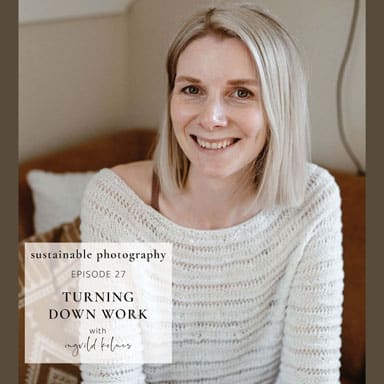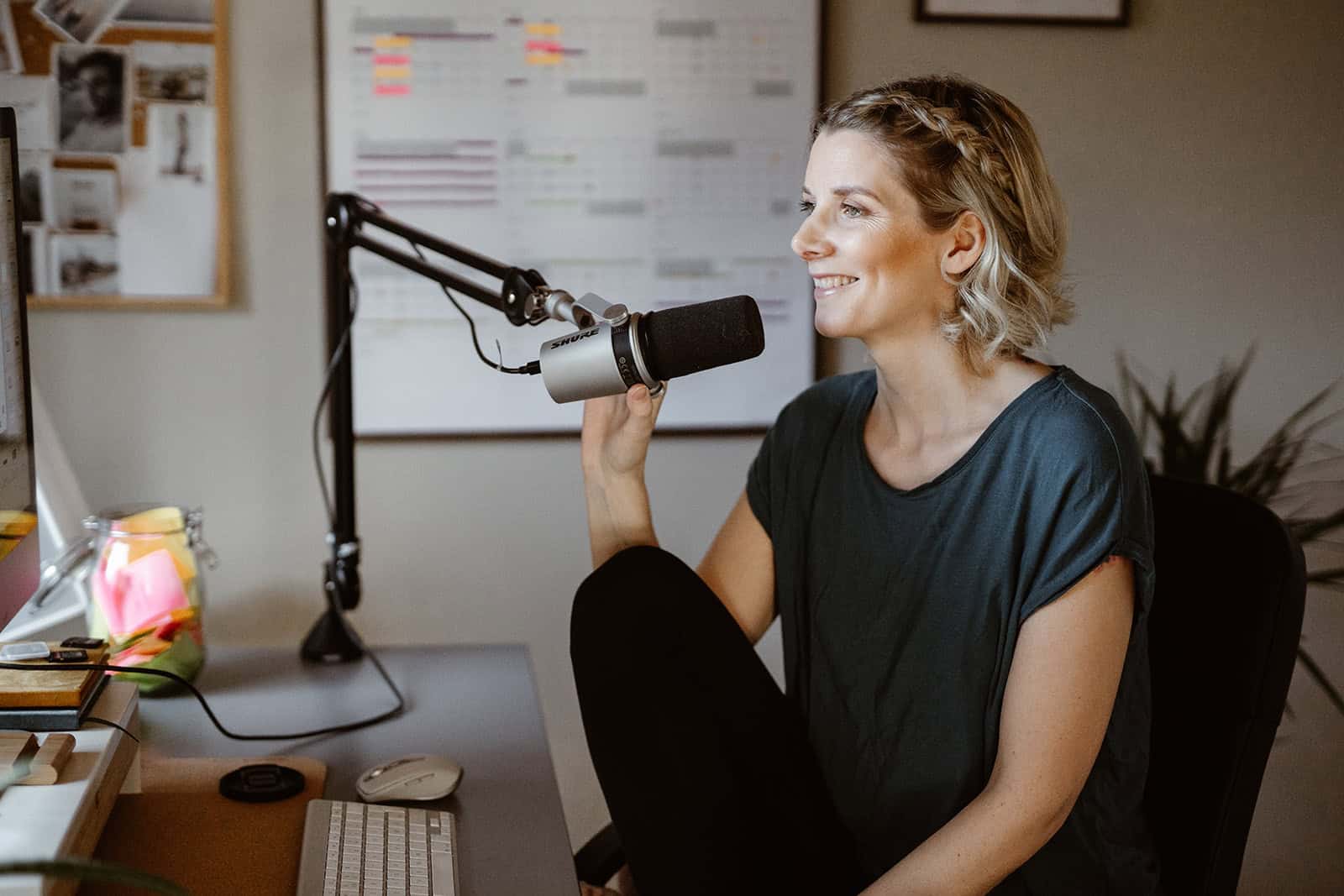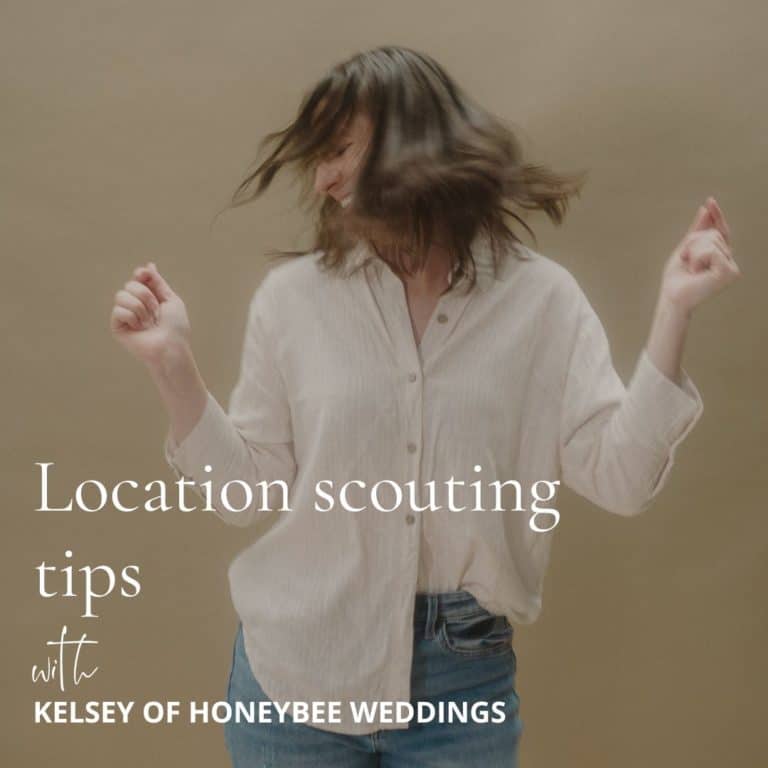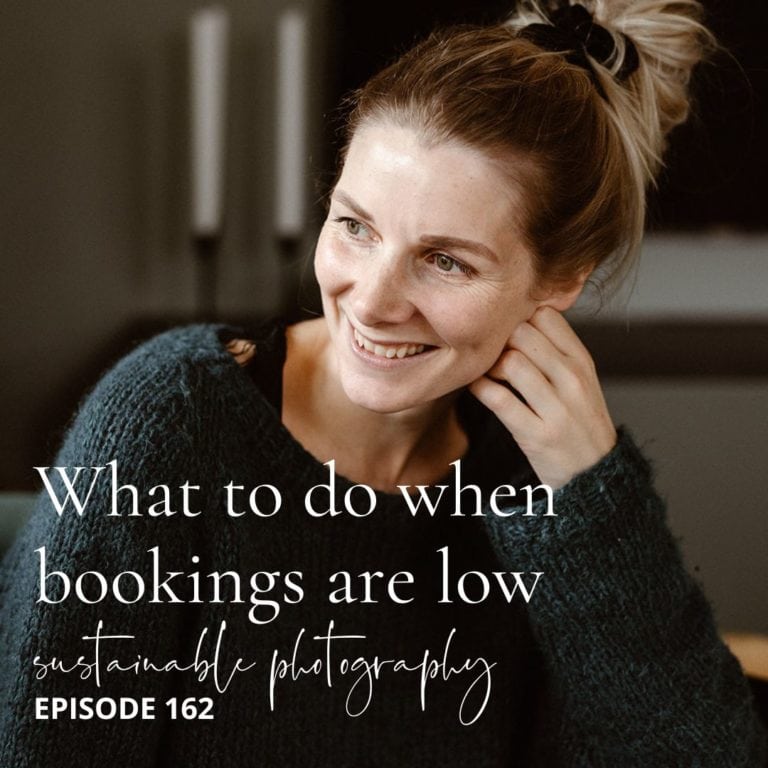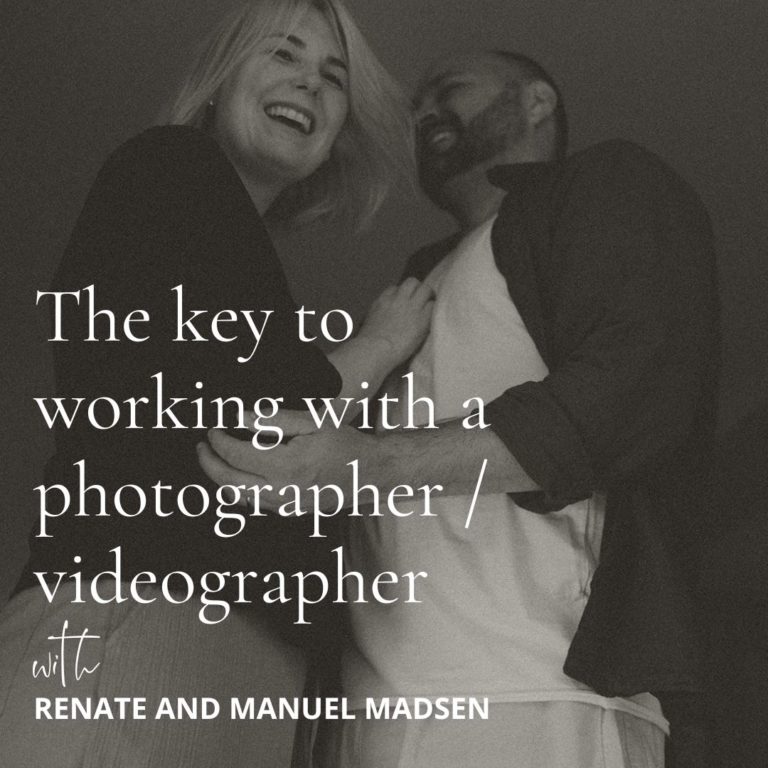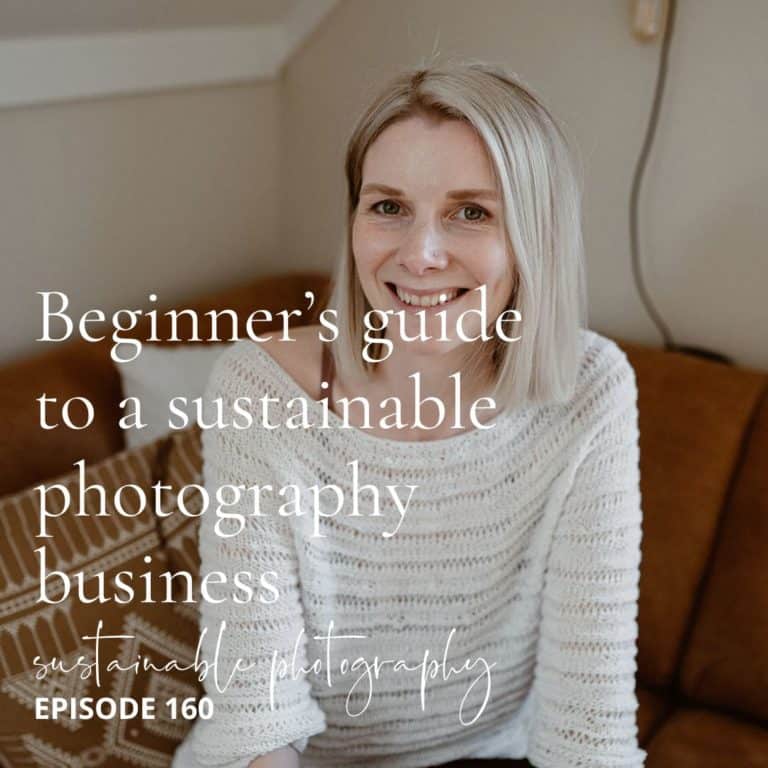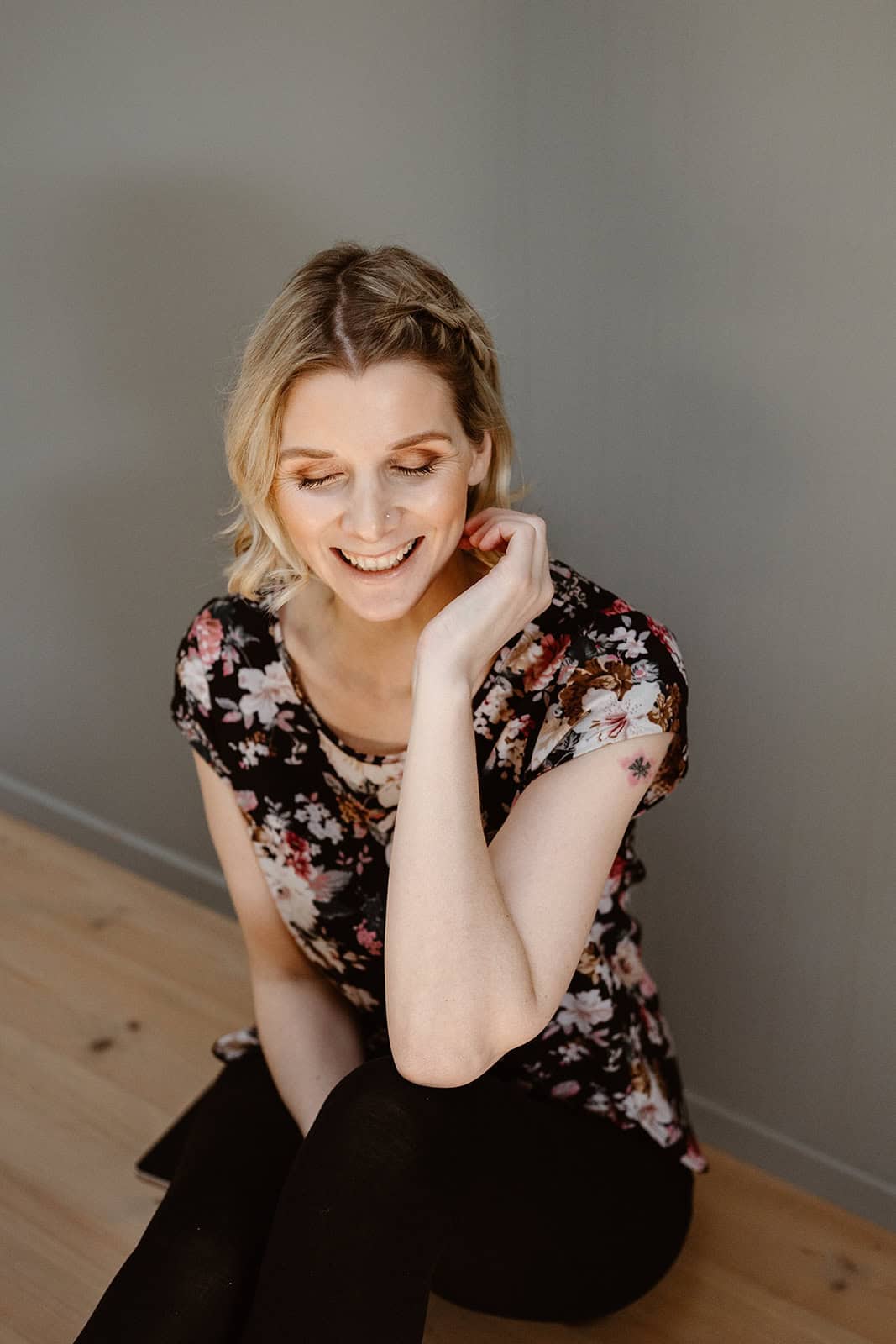<< back to the podcast overview
37. When and how to say no to clients
It’s ok to say no. And it can be what drives your business forward.
If you say yes to anything and everything you won’t have the time or the energy to do the things that you actually want to do. You won’t have the capacity to specialize and it will be hard for you to grow your business. You can easily end up stuck.
Especially as a wedding photographer, because your dates are so limited, but in general as well. You only have the time you have so if you do a little bit of everything it’s hard to get really good at it.
Every time you say yes to something you are in effect saying no to something else. Because your time is so limited. You can’t do all the things. And that goes for both jobs you don’t really want to take on or if your clients ask you to do something that’s outside of what you want to do.
Income vs passion
So, let me ask you this: Why are you saying yes to jobs that you don’t truly want? Is it a well-paid job that can let you focus on your passion? Is it because you feel guilty to turn down clients you like? Or because you feel bad about your high prices and you feel you need to be accommodating? You need to get clear on what you want and why you say yes to things you don’t really want, to be able to figure out what’s right for you.
An important thing to keep in mind is that you get more of what you share. But something that is sometimes forgotten about is that you can do work you never share. So if you do something that you don’t want to do more of or something that doesn’t fit well with your brand – just don’t share about it.
Think long term
I recommend that you try to think long-term. What is actually benefiting you? Yes, you do need money, but there are so many ways to structure your business and there is so much you can do without saying yes to things that don’t really serve you.
Saying yes to budget clients
What happens if you keep saying yes to clients who won’t pay what you know you need to charge? You know, the kinds of clients that try to make you feel bad saying that they have a budget to stick to or that their wedding cost too much or that they need the licensing to include more than what you normally include. What happens then? You’ll start to feel small. And you’ll be losing money. Not just here and now, but also in the long run. Because you get the reputation of being a cheap photographer. And you won’t get to use your clients as a referral source. Which normally can be a big part of the way you get clients.
And also, If you say yes to things you don’t normally do, you might end up giving those clients a bad experience because you’re not good enough at that thing. Because so often, it’s about more than just photography. It’s about saying the right things and posing and communicating. So make sure you’re saying yes only when you know it’s right. Doing something new or different also takes you a lot longer and might require more investments on your part, so definitely think twice before you say yes to new things.
You can also experience being guilted into saying yes to work for cheap.
Sometimes a client might ask for something that you don’t want to do. Like they want their images faster than your contract says, they want retouching done – even though you don’t do that or change their date at too short notice. A great way to set boundaries is to say, sure that can be done. It will be x$ extra. That way you’re showing you’re accommodating, yet setting a clear boundary. You’ll do it, but they have to pay. If you don’t charge YOU are the one losing out, so keep that in mind.
You might also get requests that you just can’t do, like changing your editing style. You might want to just say that editing is a part of your expression and why they chose you in the first place. Saying yes to these kinds of requests might open up to similar things in the future, so be careful not to dilute your brand.
Other times your clients might have a “great idea” where they want to do photos at a time of day when you know the light will be bad for the style of photos you do, or they want a location or backdrop you can tell won’t work. This is a good time to remind them that you’re the expert and they chose you for a reason (in a nice way of course) and let them know the consequences of not listening to you.
An experience
I got an amazing opportunity to do something different than what I normally do last year. I was ready to do it but I decided to turn it down. I’d like to tell you about it, maybe to empower you to do the same should you end up in a similar situation. Or maybe to give you a different perspective.
When you get the chance to do something really cool, you start imagining the opportunities that can lead to. For me, that was shooting for an organization in a different country. I would have already been there and it would have been a relatively straightforward job. But they wouldn’t pay the price. They offered it as a great opportunity and said it could lead to personal and professional growth. Which is probably true. It could have led to me ultimately getting more of the same kind of jobs.
But the problem is that it would probably lead to the same low-paying jobs. And more importantly, it would also mean that I would be a part of undermining the market because I why would be accepting a lot of work and giving away rights for or little pay. As this was a different job than what I normally do I checked with other photographers who do similar things and they all said the same this is way too much work for way too little pay. And they’re asking for too much when they ask you to give away all your files and they want all the rights.
So for me, it was a matter of principle because they wanted exclusive rights. Which they didn’t want to pay for. Saying yes to jobs because you think they sound like fun and that they’re gonna lead to bigger and better opportunities might seem like a good idea at the time, but in the long run, you’re doing yourself a disservice because you’re selling yourself short. And you’re potentially ruining the market and hurting all the photographers out there. It’s such a shame and I see it all the time. Photographers wanting to shoot cool elopements so they’re doing it for a little or no money because they’re building their portfolio. I’ve gotten quite used to educating potential clients or I guess I should say price shopping inquiries about the value of photography and the work we do but it doesn’t do much good when it’s other photographers that are setting the bar so low.
If this is you thinking you should work for less money because it benefits you at this point in time, I want you to think about a longer perspective. Think 5 years down the line. Would you do the same then? If your answer is yes then good for you, but if your answer is no then why are you doing now?
If you’re saying it’s because you’re building your portfolio and that’s the way you’re going to get more clients I want to challenge you on that. Getting new clients doesn’t come from having a big portfolio. You need a portfolio showing some good photos. But you can get those from shooting your own family, from sharing your life and your story. You can do a couple of portfolio-building shoots, but you don’t need to keep doing it and you don’t need to keep doing low-paid shoots. Because that’s what people are going to keep expecting from you. So I can’t you’re doing yourself a huge disservice. When it comes to getting new clients it doesn’t necessarily help just to have been in a certain place. It doesn’t necessarily help to have done a specific kind of job. Use your words explaining how do you things sharing your values back and go just as far when it comes to attracting the right clients who want to do or you want to do.
To sum it up:
- Figure out what’s important to you and where you want to be a year and five years from now.
- Keep that in mind when making decisions.
- Don’t let your clients run your business for you. Say no when they are asking for things outside of what they pay for, and outside of your expertise.
- Know that you are allowed to turn down assignments if you don’t want to do them or if they are not serving your business long-term. And remember if you want to do it, even though you don’t want more of it or if it doesn’t really fit with your brand, you never have to share about it.
I hope you get clear on what you want and you’re brave enough to stick to your principles
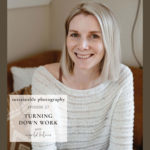
hi, I’m ingvild
This podcast is all about education and inspiration for photographers. A sustainable business is profitable and lasting. Instead of short-term wins you want to make sure you’re doing things that matter. Both to yourself, and to create the business you want. The goal of this podcast is that it will help you build and structure your business around your life, instead of the other way around.
